BROWNVILLE – At the February meeting of the Brownville village board, Kay Fish approaches the microphone. She has one question: Why am I not allowed to speak at this month’s meeting?
Before her sits the village’s newly hired attorney from Lincoln, dressed in a suit, who has been paid at least $13,733 by the tiny Nebraska community since September. Next to him is board chairman Martin Hayes, clad in flannel and a USA baseball cap, who wields a gavel that looks like it was fashioned from a tree trunk and has served on this board for 47 straight years.
He’s also Fish’s younger brother.
Flanking the pair are the other four members of the village board, all appointed – not elected – within the past year.
In that year, village leaders have severely restricted residents’ ability to speak during meetings – a move they say is necessary to get through meetings, but residents say muzzles them. Hayes futilely bangs his oversized gavel during arguments that grow so heated that he summons a sheriff’s deputy to keep the peace. Fish and Hayes, brother and sister, now only speak when facing each other at village board meetings.
In October, Brownville residents voted to recall two members of the village Board of Trustees, Natisha Winkelman and Terry Vice. A third resigned before the vote.
The next month, the board decided to hire the ousted members back into newly created jobs – a decision made after a 9-minute closed session.
Vice is now the parks superintendent. And Winkelman, fairly or unfairly the lightning rod of many residents’ ire, is now the utility superintendent and deputy clerk. The town of 140 people now has two part-time clerks.
“They thumbed their noses at the people of Brownville by giving them jobs,” said Paul Fish, former board member and Kay Fish’s husband.
People in Brownville will tell you this all goes back to water. After the board parted ways with its longtime water and sewer operator, Winkelman stepped into the role while a board member, sparking uproar from residents.
But the divide between residents and the board has ballooned into a debate over how the village board conducts business. Animosity between neighbors has devolved into screaming matches in the public park, nasty notes slipped into mailboxes and escalating legal fees in this village an hour south of Omaha.
It’s become a small-town Nebraska microcosm of the fury engulfing modern American politics.
“It ain’t that different than what we have on a national scale right now,” said Justin Wheeldon, a Brownville resident and former board member. “We have a pretty divided country. Here in Brownville, we’ve got a pretty divided town.”
***
Last June, residents of Brownville submitted a petition to recall three members of the village board, leaving only Hayes and a new member appointed that same month.
The 31 signers listed claims of mismanagement of village funds, misinformation at board meetings and a refusal to consider resident opinions. They were angry the board was changing water and sewer operators, and that board members passed an ordinance to pay themselves $25 an hour for village tasks that used to be done voluntarily.
A summer of conflict followed.
Meetings in the park to discuss the recall became shouting matches that could be heard up and down Main Street, as residents hurled insults about people’s employment history and family members.
People on both sides of the fight found anonymous letters in their mailboxes.
“Your behavior is just like my 3 year old nephew who screams, throws tantrums, yells when he doesn’t get his own way,” read an anonymous letter mailed to Kay Fish. “Get a life.”
Brownville residents started posting about the recall on Facebook, then on the post office bulletin board – pinned-up packets listing arguments for or against the recall; board members trying to explain the village’s water and sewer situation. It wasn’t unusual to see papers get torn down, or replies scribbled onto the bulletin board.
Eventually, the post office put a stop to public use of the bulletin board, resident Shane Sailors said. Only board agendas and official documents are now allowed.
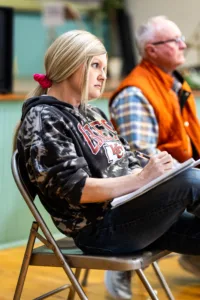
To Winkelman, one of the recalled board members, the outrage was fueled by sexism. People don’t want a woman running water operations, she said.
The Auburn Board of Public Works had overseen water for Brownville since 2007, doing tasks like sending water samples to the state and repairing the water main. But the village never signed a contract with the public utility.
In October 2022, the state notified the village that it no longer had a licensed water operator – a violation of state water regulations.
It was a shock to the board, Hayes said. The Auburn Board of Public Works had never notified Brownville it would cease services, he said.
But emails shared with the Flatwater Free Press tell a different story: For months, the Auburn public works general manager had been asking Brownville to sign a contract for water and sewer operations. The board never signed.
In Hayes’ eyes, the Board of Public Works quit. To residents, it looked like the village board fired the public utility by never signing a contract.
Winkelman and a local contractor then took over water and sewer operations for the village.
The entire recall effort happened because residents were angry at one board member, Winkelman told the Flatwater Free Press: her.
“The other two were collateral damage,” she said.
Winkelman said at one point, a resident told her they’d stop the recall if she stepped down.
When asked if there was anything the board could have done to stop the recall, Sailors said: “There wasn’t anything short of them getting rid of (Winkelman) … she’s just obviously the problem.”
Winkelman said she still gets angry notes in her mailbox. The most recent, found on Saturday: “Crawl back where you came from,” scrawled on a scrap of paper, signed by Sailors.
Sailors denied writing the note.
“No, I did not do that. Believe me, I would say I did it,” Sailors said. “I did one time post on Facebook that I wish they would crawl back into the hole they came out of.”
***
Winkelman and Vice were recalled in 48-29 and 45-32 votes, respectively. The third board member, Bailey Bindle, resigned weeks before the recall. The vote cost the village $2,163.
The hope had been to recall all three, leaving only two board members and forcing an election to vote on an almost entirely new board.
But because Bindle resigned before the vote, the board was able to appoint new members – not necessarily the people the recall supporters hoped to elect.
Then, just before Thanksgiving, the board announced Winkelman and Vice would start new jobs for the village.
Both have four-year contracts setting their pay at $15 an hour. The contracts also include a termination clause guaranteeing their pay for the entirety of that four-year contract, which angered village residents even more. Brownville attorney Stephen Mossman said in a March interview that clause was “unenforceable.”
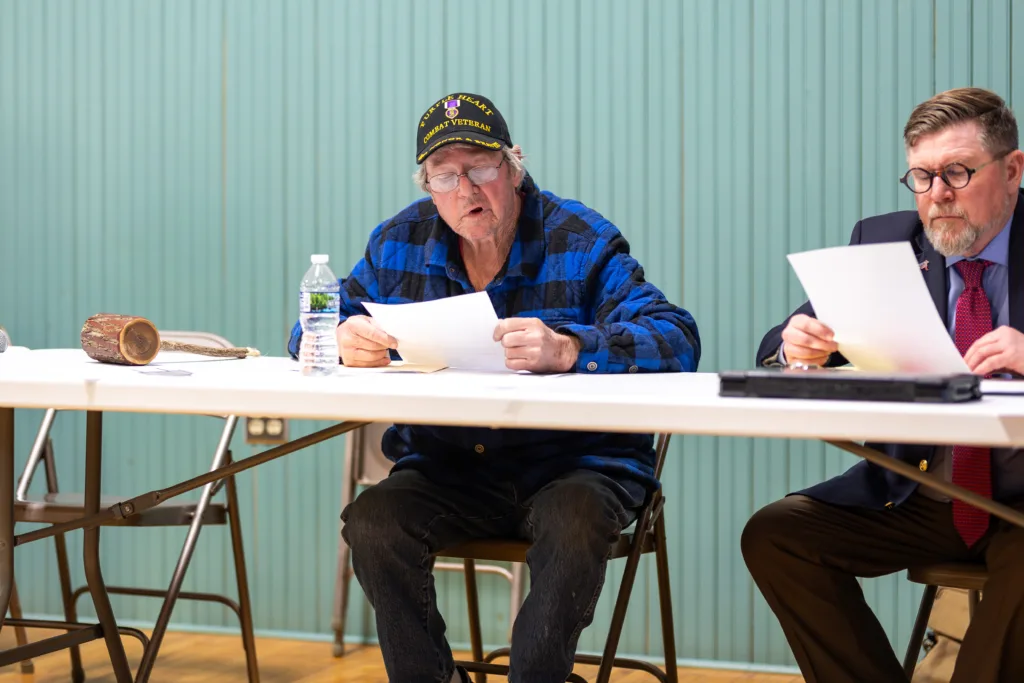
In his four months on the job, Vice hasn’t accepted pay for the work he’s done, said Hayes, the longtime board chairman. Winkelman has been paid for her work as water and sewer operator, but hasn’t accepted pay for her work as deputy clerk. Village monthly expense reports reflect this.
“My work is voluntary,” she said. “I’m here to better the village.”
The village needed someone in those roles, Hayes said. As a board member, Vice had been overseeing a parks project that will bring $30,000 into the village. The board hired him to keep him on the project, Hayes said.
Winkelman was the most qualified of the three applicants for the combined deputy clerk and utility supervisor position, he said.
To residents who don’t agree with the hiring, Hayes said: “They had their chance to put in a resume.”
The newly created jobs were posted publicly at the post office and village office, Hayes said. But the creation of these new positions was never discussed in board meetings – which village residents believe violates the Nebraska Open Meetings Act.
“It was a pretty big slap in the face to me,” Wheeldon said. “That tells me you’re not necessarily representing the people of Brownville. We recalled those individuals for a reason.”
***
Two dozen Brownville residents parked on Main Street, filed into the Opera House and filled most of the folding chairs set out for the board’s March meeting.
The board and those assembled quickly started squabbling about a proposed ordinance. An ordinance outlining how Brownville spends money on holiday candy.
Sailors approached the microphone and asked: Why were leftover Christmas baskets taken to one local church but not the other?
She got no answer.
Kay Fish complained of limited access to the village office, with the door often locked to the public while board members and their families get full access.
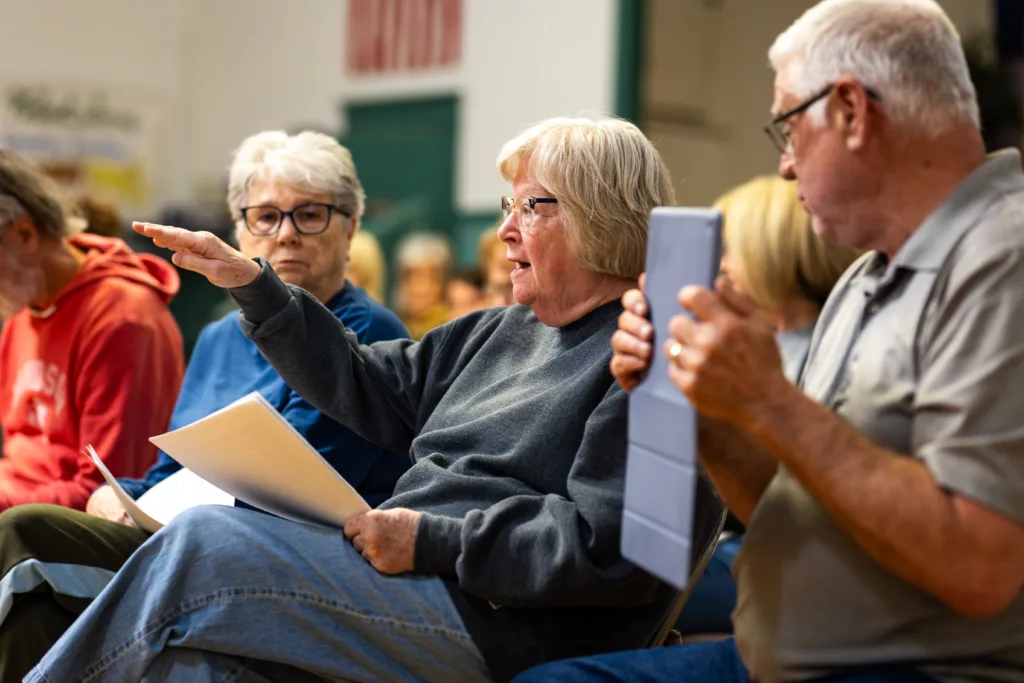
The board allowed Fish to store books for the village Little Free Library in the building, but she said she could never get to her books to replenish the library.
“I think what the real issue is, is the location of where those books are stored,” one board member said. “That can be considered a fire hazard.”
A resident shouted from the crowd: If the board was so concerned with fire safety, what about the gallons of old funnel cake oil stored in the basement?
Kristy Mertes, the clerk hired before Winkelman became deputy clerk, spoke up.
“I don’t even have a key to the village office anymore,” she said.
Since the recall, transparency and access to information have gotten worse, village residents told the Flatwater Free Press.
In August, the board hired Mossman, the Lincoln-based attorney. At $350 an hour, he’s represented AltEn, Big Red Keno and Blackshirt Feeders, set to be the largest feedlot in Nebraska.
He makes the drive from Lincoln to Brownville for each board meeting, present “to make sure we’re doing everything legally,” Hayes said.
“The fact that you have to have an attorney present at all your meetings advising you on everything you’re doing, that raised a red flag to me,” said Wheeldon, the former board member. “Never once did I feel like I needed to have an attorney to make sure I was on the up and up.”
Since September, the village has paid Mossman $13,733 in legal fees, more than doubling what it paid its previous attorney in the same time period.
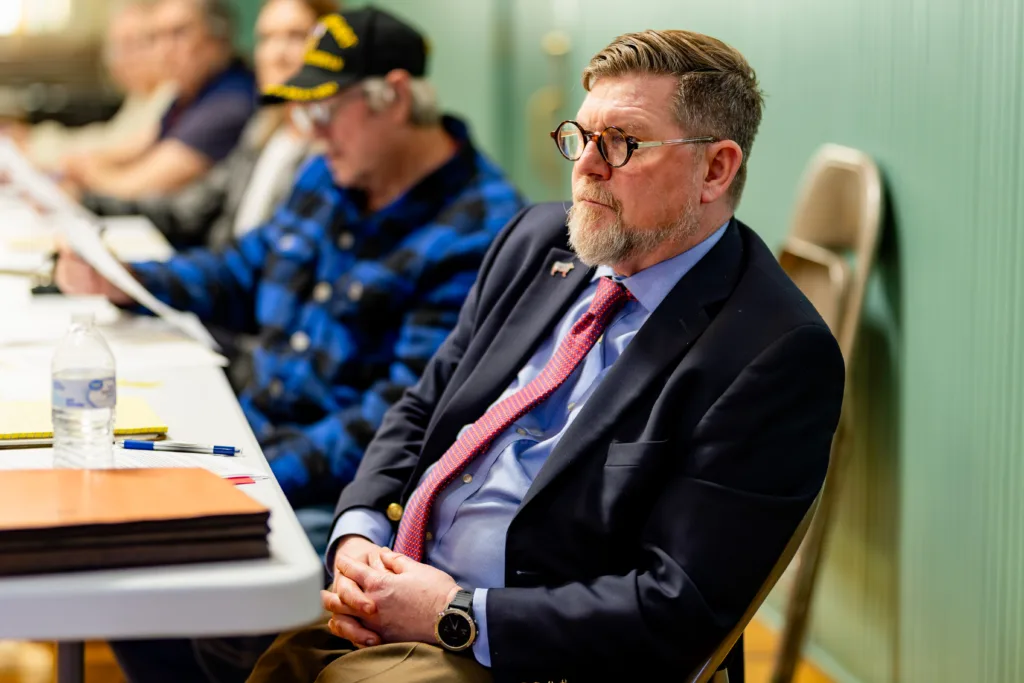
The uptick in legal expenses comes from “all this turmoil,” Hayes said. Records requests from a handful of individuals have caused a “significant increase in attorney fees.”
Residents have also been told that certain questions can only be answered by the village accountant or attorney, rather than board members themselves.
“You will be charged (the accountant’s) hourly fee of $150.00 per hour,” Winkelman wrote in an email to resident John Lauber in December. “If you’d like information or copies from our village attorney, please be aware that his hourly rate is $350.00 which will be billed to you personally.”
Winkelman has refused to provide recordings of village meetings that she streamed on Facebook, telling residents she doesn’t need to provide them “as it was done on my personal cell phone for my own personal reason.”
The board has also started limiting when residents can and can’t talk, banning public comment throughout its meetings and allowing it only during select agenda items.
But residents told the Flatwater Free Press it’s hard to get added to the agenda. They’re told if they’re not discussing new business, then the topic is considered moot.
“It used to be, Marty, the chairman, at meetings would say, ‘Does anybody have anything they want to talk about?’ And anybody could say anything about anything at the meetings and it was listened to,” Paul Fish said.
Now, Hayes bangs his gavel when residents talk out of turn, shouting for silence. Halfway through the March meeting, a sheriff’s deputy walked in, summoned by the deputy clerk.

“We used to let people talk until it got to where they wouldn’t shut up,” Hayes said in an interview. “Once or twice we had to adjourn the meeting completely because they wouldn’t be quiet.”
The board’s March meeting was a rare occasion where public comment was allowed on the issue that’s been fueling unrest: the village’s billing contract with the Auburn Board of Public Works.
In three-minute increments, 12 people stood up:
“They charge $320 a month,” Kay Fish said of the Board of Public Works’ billing fee. “You know what? That’s less than your Lincoln lawyer charges an hour.”
“You listen to the town,” another resident said. “The town elected you to listen to us.”
“I’ve been watching all these people talk to you guys. You can tell on your faces, you haven’t heard a damn word they’ve said,” another said. Some people in the crowd applauded.
***
There’s no resolution, only more strife, on the horizon in Brownville.
Paul and Kay Fish say friends have suggested the recall supporters hire their own attorney to combat the village attorney. Sailors has filed a complaint with the office of State Auditor Mike Foley.
Lauber, another recall supporter, contacted the Nebraska Attorney General’s office. He said an employee there told him to go to the Nemaha County Attorney. But then the county attorney – who also represents the Auburn Board of Public Works – pointed him back to the Nebraska Attorney General.
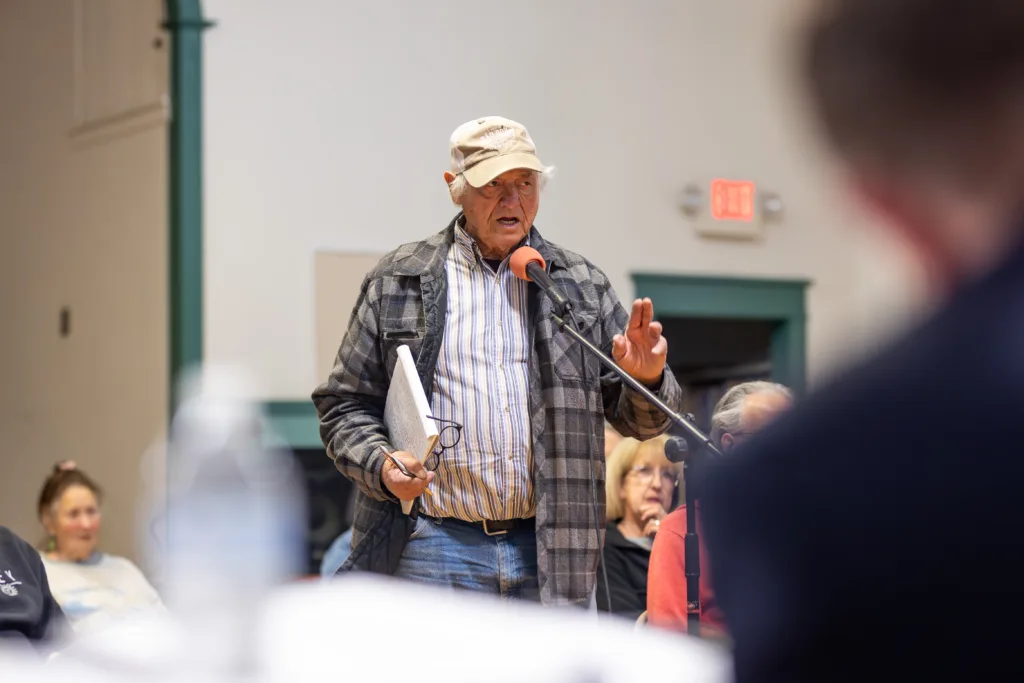
The board, for its part, feels beleaguered and overwhelmed by the amount of information being requested by residents and the state alike.
“I’ve never seen them (the state auditor’s office) ask for as much detail as they’re asking for,” village accountant Heather Pemberton said while discussing the village’s audit waiver request during the board’s February meeting.
The consistent suggestion given to Paul and Kay Fish: Vote the board out.
“The one thing they say is let’s wait until November and vote them off,” Kay Fish said. “We voted (Winkelman) off. We voted (Vice) off. They were rehired. What more can we say to them?”
In the meantime, there’s a growing sense from some residents that Brownville has lost something important during this fight.
“When I first moved here, I looked at the board and I saw my friends, I saw my neighbors,” said resident Bill Robbins. Now? “I don’t get the feeling that we’re all welcome here.”
Said Wheeldon: “One side’s not always 100% right and one side’s not always 100% wrong. But you’ve got to work together. If you’re just fighting amongst yourselves, you’re never going to make any progress.”



8 Comments
Although this degree of acrimony has escalated in recent years? It is not of recent origin in rural Nebraska. Over a decade ago, my father’s hometown (pop. 927) was embroiled in a “civil war” regarding the town’s two medical providers. From my contacts? I am told that it yet continues. During my tenure there, I was also told to “crawl back under that rock.” And? Called “trash” (face-to-face). Which begs the question… This is the Heartland?
Natalia and the Flatwater Free Press have done a fantastic job of reporting. The precious right of free speech we still have in the United States is being protected by their work. As the inscription on the Nebraska State Capital states “The Salvation of the State is Watchfulness in the Citizen.”
This would make a fantastic podcast.
Or a Saturday night live skit! Almost sounds like a Garrison Keillor woebegone broadcast, except they were always nice.
Thank you for covering our March meeting.
You provided a balanced report.
I appreciate a FREE Press.
As a retired small town news reporter who’s covered more county commissioner, city council and school board meetings than I care to count, I’ve come to the conclusion that officials deal with what they understand. It sounds simplistic, but in one rural town population under 2,000 where I worked (different state), the county commissioners could talk roads for hours. But when the local hospital was having financial issues they kept firing the administrator because they didn’t like (understand?) what was being told them. Sometimes there is justification for the frustration. Sometimes there are people who like to be a big fish in a small town and want to abide by their own rules without seeing a bigger picture. Sometimes what works in a larger population area doesn’t work so well in a small town. I know Brownville has some issues because of the historical aspect of the community, but it’s enough off the beaten track that attracting people to live there is difficult.
By the time the big city lawyer stops fleecing them because they ran out of money, all of them will be embarrassed. Is Winkleman a licensed water operator? How much are they paying the water contractor?
Hate sure is becoming expensive in this country. Makes one question what exactly are the school systems teaching when it comes to working for the good of all.
I don’t believe hate is being taught in schools. When the president of the most powerful nation in the free world was allowed to heckle United States senators and representatives, to call them derogatory names in public, to make unkind remarks about the appearance of a male senator’s wife….economics is not the only thing that “trickles down”. Look no further than our nations leaders to see where a lot of hate takes root in the minds of party followers. So much hate that American citizens defiled our nation’s capitol building and bludgeoned those sworn to protect it. It is up to us, the citizens, to set. good examples for our nation’s youth. If we want to stop the hatred and bad behavior, we all need to start with the person in the mirror.